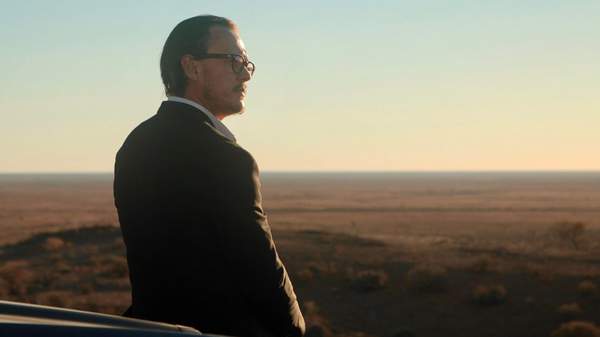Overview
Wake in Fright and Mad Max 2 have a lot to answer for. While one remains a flat-out Australian masterpiece after almost half a century and the other belongs to our best dystopian action franchise, they've spawned more than their fair share of imitators. Many Aussie films have aped their visions of broken, isolated, male-dominated worlds. Quite a few have also used their shooting location, Broken Hill. It's easy to understand why: examining toxic masculinity's extremes is a juicy subject, and the outback town on the far-western edge of New South Wales' dusty expanse cuts a striking sight on the big screen. When layered one over the other, the seemingly endless array of scrubby nothingness that encircles the remote spot appears to pulsate with oppressive desolation.
The third film in four years from director Heath Davis (after 2016's Broke and 2018's Book Week), grimy crime thriller Locusts is happy to trot out the above template once again. There's another thoroughly recognisable element at play as well, one that also pops up in Wake in Fright and other Aussie flicks like The Cars That Ate Paris and Welcome to Woop Woop: the outsider wandering across this desert landscape and discovering its hostility for himself. Here, that task falls to slick technology bigwig. Ryan Black (Ben Geurens), who returns to the drought-stricken ex-mining town of Serenity Crossing after the death of his estranged dad. Complete with a far-from-cosy reunion with his brother (Nathaniel Dean) and the old girlfriend-turned-single mum and stripper (Jessica McNamee) he long left behind, everything about this scenario ticks a heap of familiar boxes.
Thugs, drugs, broken dreams, family secrets — throw in Cold Chisel on the pub radio (they sang about Broken Hill, aka the Silver City, in 'Khe Sanh'), and Locusts always plays out as expected. When a group of inhospitable locals make it clear that Ryan isn't welcome, but still demands he settle his father's debts, it seems as if first-time screenwriter Angus Watts is stamping squares on a generic movie bingo card. The more twists and turns that pop up, the more that this feels true, with Locusts' various plot developments wavering between convenient and flimsy. Flashes of a man yelling at a kid with a gun earn the same description, although they're clearly designed to ramp up the tension. And as for a hefty late revelation that tries to keep things topical, it feels tacked-on rather than meaningful.
Why do films continually wade through such well-worn terrain? It makes for easy, B-movie-style genre fare and, in Australia, we sure do have the backdrop for it. In Locusts and Heath Davis' case, the movie also taps into a theme that the director keeps pondering across his career. While they're set in vastly different circumstances and brandish incredibly different tones, Broke and Book Week also follow men thrown out of their depth by the vagaries of life, then scrambling to recover. Locusts is his least convincing example to-date, however. That said, Geurens' somewhat dull lead performance aside, the film does overflow with suitably scruffy, stern, grizzled men (including Peter Phelps, Broke's Steve Le Marquand, Book Week's Alan Dukes and late actor Damian Hill in one of his final screen performances) who look and feel as rough and tough as all the dirt and bush that's constantly in sight.
Filling the movie with sun-dappled shades of earthy reds, murky browns and parched yellows, cinematographer Chris Bland (another Broke and Book Week alum) not only has Locusts' best job, but does Locusts' best job. While Broken Hill doesn't look anywhere near as captivating in real life as it frequently does on the screen, it's hard to point a camera at its rusty vistas without finding a fittingly moody shot. So, Bland does this often. Once again, this fits the picture's contemplation of struggling men laid bare in forbidding surroundings, but the heavy emphasis on the landscape does stand out. For the film's characters, the town's post-apocalyptic scenery is a barrier that stops them from moving on. For the film itself, it's yet another crutch used by an inescapably familiar feature that repeatedly leans on obvious elements.
Features
Information
When
Thursday, October 17, 2019 - Wednesday, November 6, 2019
Thursday, October 17 - Wednesday, November 6, 2019
Where
Select cinemas in MelbourneVarious locations
Price
$15–25-
Event Type
